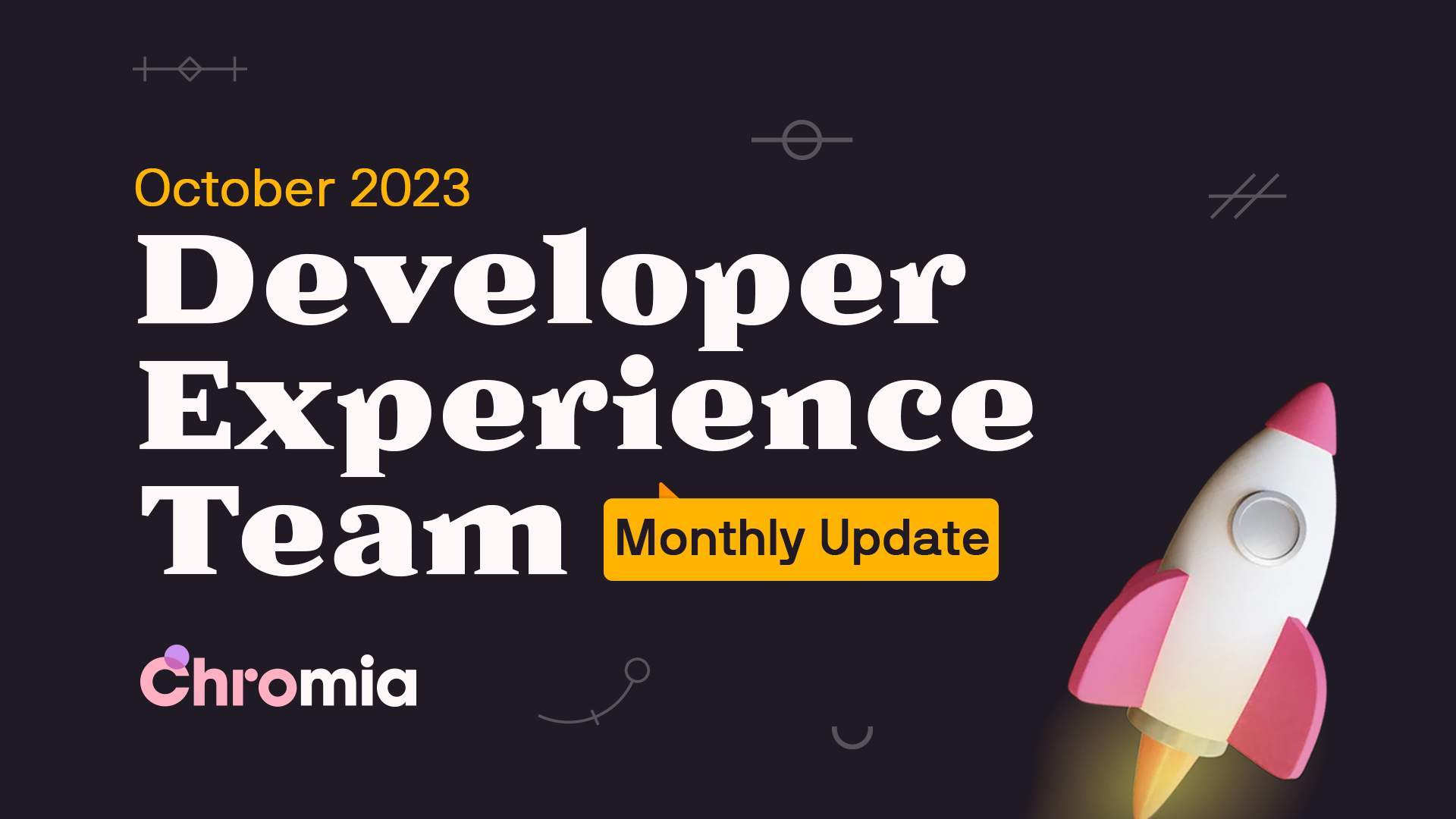October 18, 2023
Greetings Chromia Developers and Community,
Welcome to the tenth instalment of our mid-month DevEx Team Update! Our goal is to provide you with the latest updates on the improvements being made to documentation, tooling, and network design to support the growth of the Chromia ecosystem.
Please note, our monthly retail updates focusing on development milestones, network/ecosystem expansion, and marketing efforts will continue to be released at the end of each month.
Documentation Updates
- Earlier this week, we announced the soft launch of Chromia Learn, a collection of educational materials for aspiring Chromia dapp developers featuring hands-on courses.
- A section about EVM bridging has been added to the ‘Advanced usage’ tab of the Official Chromia Documentation.
- Last month, we announced the creation of a subteam dedicated to Developer Education. This subteam is taking the lead on a number of tasks, including:
- The expansion of Chromia Learn resources with new courses and guides
- Ongoing restructuring and refinement of Chromia’s Documentation, with a particular focus on Rell Documentation
- Further progress on RellDoc and the related API Reference Documentation is on hold until an upcoming update to the Rell compiler is released.
Tooling and Feature Updates
Chromia CLI
- In preparation for bridging, the Ethereum Interoperability Framework (EIF) module has been added to the official CLI distribution.
- A feature has been added that allows developers to verify in advance that proposed changes can be successfully applied to an existing blockchain.
- Added the ‘--ft-auth’ flag to the ‘chr tx’ command, enabling transactions to FT4 compatible dapps.
- Added the ‘--list-modules’ flag to the `chr deployment inspect’ command, which generates a list of all the modules that are deployed within a dapp.
- Added the ‘--wipe/--no-wipe’ flag to the `chr node start’ command, making it easier to choose whether a node retains existing data or starts from scratch.
- Added the ‘--sql-log’ flag to the ‘chr test’ command, which enables SQL logging while running tests.
- The `chr generate-client-stubs` command now supports postchain-client version 1.5.9+ when generating typescript stubs
- The `chr install` command can now download libraries from private git repositories using your ssh-agent
Package Manager
- The package manager is now able to install Rell libraries from both public and private git repositories. The private option uses the ssh-agent for authentication.
- The decision has been made to discontinue the use of the on-chain libraries, due to the possibility of the dapp becoming too large and resource intensive over time.
Chromia Explorer
- A toggle has been added to the top right corner of the Chromia Explorer, allowing users to switch between multiple networks from a single interface.
- You can now view FT4 accounts in the Explorer and view asset balances, transfer history, and access controls. These features have been added in preparation for the coming increase in FT4 token use on Chromia powered networks.
- We are now working on a feature that will use network analytics to generate a list of the most active dapps.
Rell Formatter (for VS Code and Eclipse Plugins)
- The formatter was updated to be less strict regarding line breaks. Users can now define where an expression should be line separated, as long as it stays within the set maximum line width.
- We are continuing to collect feedback from Chromia and ecosystem project developers to create common best practices for syntax and formatting within Rell code.
IntelliJ Rell Plugin
- The IntelliJ Rell plugin is now available on the IntelliJ marketplace. IntelliJ Ultimate users can enjoy full plugin functionality with LSP (Language Server Protocol) support, while IntelliJ Community users can also use the plugin, without LSP support.
Current Tasks
- Restructure Rell documentation
- Develop more Chromia Learn resources
- Expand and refine the Chromia CLI command set
- Continue development on Chromia Explorer
- Collect feedback for the Rell formatter
Until Next Month,
The Chromia Developer Experience Team
About Chromia
Modern society runs on data and every online service you’re using is built upon underlying databases - ranging from your online bank to music streaming and gaming. Chromia is a relational blockchain - a combination of a relational database and a blockchain - making it easy to develop user-friendly decentralized apps for almost any industry, including DeFi, NFTs, gaming, and more.
Website | Twitter | Telegram | Facebook | Instagram | Youtube | Discord
